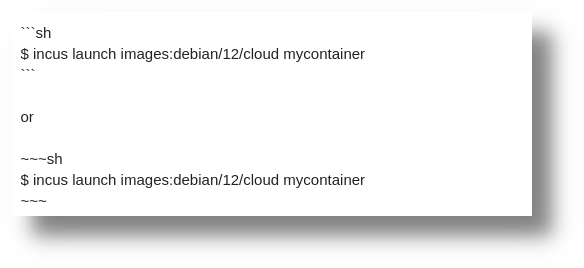There are 1 debian-gateway-cli and 2 Ubuntu 22.04 lxd containers:
Internet (through NAT) ← debian-gateway-cli ← internet-gateway ← end-user
If I remove the debian-gateway container from the network chain and connect the internet-gateway container via the default lxdbr0 bridge, then using the ping utility, one of the problems on the internet-gateway is visible:
There is a problem with traffic forwarding between 2, eth1 and eth0 interfaces in the internet-gateway container
I’m also sure that I need to add route, but I don’t know exactly how to do it correctly
root@nternet-gateway:~# ping 8.8.8.8
PING 8.8.8.8 (8.8.8.8) 56(84) bytes of data.
64 bytes from 8.8.8.8: icmp_seq=1 ttl=57 time=21.2 ms
64 bytes from 8.8.8.8: icmp_seq=2 ttl=57 time=27.5 ms
root@nternet-gateway:~# ping -I eth1 8.8.8.8
PING 8.8.8.8 (8.8.8.8) from 172.16.0.1 eth1: 56(84) bytes of data.
From 172.16.0.1 icmp_seq=1 Destination Host Unreachable
root@nternet-gateway:~# ping -I eth1 10.63.169.1
PING 10.63.169.1 (10.63.169.1) from 172.16.0.1 eth1: 56(84) bytes of data.
From 172.16.0.1 icmp_seq=1 Destination Host Unreachable
From 172.16.0.1 icmp_seq=2 Destination Host Unreachable
root@nternet-gateway:~# ping -I eth1 10.63.169.200 - IP of eth0 (dhcp 4)
PING 10.63.169.200 (10.63.169.200) from 172.16.0.1 eth1: 56(84) bytes of data.
From 172.16.0.1 icmp_seq=1 Destination Host Unreachable
From 172.16.0.1 icmp_seq=2 Destination Host Unreachable
debian-gateway-cli:
The debian-gateway is a fully working container, there are no problems with it.
It redirected all our traffic through TOR, which makes it difficult to use the troubleshooting ping utility
root@debian-gateway:~# ifconfig -a
eth0: flags=4163<UP,BROADCAST,RUNNING,MULTICAST> mtu 1500
inet 10.0.2.15 netmask 255.255.255.0 broadcast 10.0.2.255
ether 00:16:3e:ba:92:9e txqueuelen 1000 (Ethernet)
RX packets 18225 bytes 12375456 (11.8 MiB)
RX errors 0 dropped 0 overruns 0 frame 0
TX packets 15522 bytes 5415235 (5.1 MiB)
TX errors 0 dropped 0 overruns 0 carrier 0 collisions 0
eth1: flags=4163<UP,BROADCAST,RUNNING,MULTICAST> mtu 1500
inet 10.152.152.10 netmask 255.255.192.0 broadcast 10.152.191.255
ether 00:16:3e:82:79:28 txqueuelen 1000 (Ethernet)
RX packets 2510 bytes 149307 (145.8 KiB)
RX errors 0 dropped 0 overruns 0 frame 0
TX packets 2468 bytes 6426402 (6.1 MiB)
TX errors 0 dropped 0 overruns 0 carrier 0 collisions
internet-gateway:
~$ lxc config show internet-gateway
architecture: x86_64
config:
image.architecture: amd64
image.description: ubuntu 22.04 LTS amd64 (release) (20240125)
image.label: release
image.os: ubuntu
image.release: jammy
image.serial: “20240125”
image.type: squashfs
image.version: “22.04”
volatile.base_image: 18124c86c222348c858ff33dab3e8afcf218353747172d93f4ad8c5a827c014e
volatile.cloud-init.instance-id: 241c2986-6ecc-47e2-87fd-67922c90582e
volatile.eth0.host_name: veth3a0e49a7
volatile.eth0.hwaddr: 00:16:3e:a6:77:56
volatile.eth1.host_name: vetha30094ef
volatile.eth1.hwaddr: 00:16:3e:c4:9e:ed
volatile.eth1.name: eth1
volatile.idmap.base: “0”
volatile.idmap.current: ‘[{“Isuid”:true,“Isgid”:false,“Hostid”:1000000,“Nsid”:0,“Maprange”:1000000000},{“Isuid”:false,“Isgid”:true,“Hostid”:1000000,“Nsid”:0,“Maprange”:1000000000}]’
volatile.idmap.next: ‘[{“Isuid”:true,“Isgid”:false,“Hostid”:1000000,“Nsid”:0,“Maprange”:1000000000},{“Isuid”:false,“Isgid”:true,“Hostid”:1000000,“Nsid”:0,“Maprange”:1000000000}]’
volatile.last_state.idmap: ‘[{“Isuid”:true,“Isgid”:false,“Hostid”:1000000,“Nsid”:0,“Maprange”:1000000000},{“Isuid”:false,“Isgid”:true,“Hostid”:1000000,“Nsid”:0,“Maprange”:1000000000}]’
volatile.last_state.power: RUNNING
volatile.last_state.ready: “false”
volatile.uuid: 3d1bc1d9-fbea-434e-9167-a3217162cbcb
volatile.uuid.generation: 3d1bc1d9-fbea-434e-9167-a3217162cbcb
devices: {}
ephemeral: false
profiles:
- who-profile-client
stateful: false
description: “”
~$ lxc profile show who-profile-client
config: {}
description: Default Whonix Client profile
devices:
eth0:
name: eth0
nictype: bridged
parent: who-clientbr0
type: nic
eth1:
nictype: bridged
parent: vpn-clientbr0
type: nic
root:
path: /
pool: default
type: disk
name: who-profile-client
used_by:
- /1.0/instances/internet-gateway
~$ lxc network show who-clientbr0
config:
ipv4.address: 10.152.152.0/18
ipv4.dhcp.gateway: 10.152.152.10
ipv4.nat: “true”
ipv6.address: none
description: “”
name: who-clientbr0
type: bridge
used_by:
- /1.0/instances/internet-gateway
- /1.0/instances/debian-gateway
- /1.0/profiles/who-profile-client
- /1.0/profiles/who-profile-gat
managed: true
status: Created
locations: - none
~$ lxc network show vpn-clientbr0
config:
ipv4.address: none
ipv6.address: none
description: “”
name: vpn-clientbr0
type: bridge
used_by:
- /1.0/instances/end-user
- /1.0/instances/internet-gateway
- /1.0/profiles/enduser-profile-byo
- /1.0/profiles/who-profile-client
managed: true
status: Created
locations: - none
root@internet-gateway:~# netplan get
network:
version: 2
ethernets:
eth0:
dhcp4: true
eth1:
addresses:
- “172.16.0.1/24”
dhcp4: false
dhcp6: false
accept-ra: false
root@internet-gateway:~# ip route show dev eth0
default via 10.152.152.10 proto dhcp src 10.152.129.235 metric 100
10.152.128.0/18 proto kernel scope link src 10.152.129.235 metric 100
10.152.152.0 proto dhcp scope link src 10.152.129.235 metric 100
10.152.152.10 proto dhcp scope link src 10.152.129.235 metric 100
root@internet-gateway:~# ip route show dev eth1
172.16.0.0/24 proto kernel scope link src 172.16.0.1
Enabling IP forwarding in /etc/sysctl.conf:
root@internet-gateway:~# sysctl -p
net.ipv4.conf.all.forwarding = 1
Forwarding trafic between 2 interfaces using iptables:
root@internet-gateway:~# iptables -A FORWARD -i eth0 -o eth1 -m state --state RELATED,ESTABLISHED -j ACCEPT
root@vinternet-gateway:~# iptables -A FORWARD -i eth1 -o eth0 -j ACCEPT
root@internet-gateway:~# iptables-save > /etc/iptables.rules
To restore the “iptables” rules on reboot, create a file ‘/etc/network/if-pre-up.d/iptables’ with following content:
root@internet-gateway:~# nano /etc/network/if-pre-up.d/iptables
root@internet-gateway:~# cat /etc/network/if-pre-up.d/iptables
#!/bin/sh
/sbin/iptables-restore < /etc/iptables.rules
root@internet-gateway:~# chmod +x /etc/network/if-pre-up.d/iptables
root@internet-gateway:~# cat /etc/iptables.rules
*filter
:INPUT ACCEPT [0:0]
:FORWARD ACCEPT [0:0]
:OUTPUT ACCEPT [0:0]
-A FORWARD -i eth0 -o eth1 -m state --state RELATED,ESTABLISHED -j ACCEPT
-A FORWARD -i eth1 -o eth0 -j ACCEPT
COMMIT
root@internet-gateway:~# ifconfig -a
eth0: flags=4163<UP,BROADCAST,RUNNING,MULTICAST> mtu 1500
inet 10.152.129.235 netmask 255.255.192.0 broadcast 10.152.191.255
inet6 fe80::216:3eff:fea6:7756 prefixlen 64 scopeid 0x20
ether 00:16:3e:a6:77:56 txqueuelen 1000 (Ethernet)
RX packets 51 bytes 9923 (9.9 KB)
RX errors 0 dropped 0 overruns 0 frame 0
TX packets 72 bytes 7330 (7.3 KB)
TX errors 0 dropped 0 overruns 0 carrier 0 collisions 0
eth1: flags=4163<UP,BROADCAST,RUNNING,MULTICAST> mtu 1500
inet 172.16.0.1 netmask 255.255.255.0 broadcast 172.16.0.255
inet6 fe80::216:3eff:fec4:9eed prefixlen 64 scopeid 0x20
ether 00:16:3e:c4:9e:ed txqueuelen 1000 (Ethernet)
RX packets 684 bytes 49888 (49.8 KB)
RX errors 0 dropped 0 overruns 0 frame 0
TX packets 610 bytes 46976 (46.9 KB)
TX errors 0 dropped 0 overruns 0 carrier 0 collisions
end-user:
~$ lxc config show end-user
architecture: x86_64
config:
image.architecture: amd64
image.description: ubuntu 22.04 LTS amd64 (release) (20240126)
image.label: release
image.os: ubuntu
image.release: jammy
image.serial: “20240126”
image.type: squashfs
image.version: “22.04”
volatile.base_image: 9ab2ae1bf60aa4376701422f44fa37b6dcdad709385b87416ad0cf5d49398369
volatile.cloud-init.instance-id: b6f960be-2e31-4f5e-886f-68eb3f9c035a
volatile.eth0.host_name: veth55cc3141
volatile.eth0.hwaddr: 00:16:3e:08:9e:58
volatile.eth0.name: eth0
volatile.idmap.base: “0”
volatile.idmap.current: ‘[{“Isuid”:true,“Isgid”:false,“Hostid”:1000000,“Nsid”:0,“Maprange”:1000000000},{“Isuid”:false,“Isgid”:true,“Hostid”:1000000,“Nsid”:0,“Maprange”:1000000000}]’
volatile.idmap.next: ‘[{“Isuid”:true,“Isgid”:false,“Hostid”:1000000,“Nsid”:0,“Maprange”:1000000000},{“Isuid”:false,“Isgid”:true,“Hostid”:1000000,“Nsid”:0,“Maprange”:1000000000}]’
volatile.last_state.idmap: ‘[{“Isuid”:true,“Isgid”:false,“Hostid”:1000000,“Nsid”:0,“Maprange”:1000000000},{“Isuid”:false,“Isgid”:true,“Hostid”:1000000,“Nsid”:0,“Maprange”:1000000000}]’
volatile.last_state.power: RUNNING
volatile.last_state.ready: “false”
volatile.uuid: 55d7f9ec-de86-469a-b683-1a4d9f6baec0
volatile.uuid.generation: 55d7f9ec-de86-469a-b683-1a4d9f6baec0
devices:
root:
path: /
pool: default
type: disk
ephemeral: false
profiles:
- enduser-profile-byo
stateful: false
description: “”
root@end-user:~# ifconfig -a
eth0: flags=4163<UP,BROADCAST,RUNNING,MULTICAST> mtu 1500
inet 172.16.0.10 netmask 255.255.255.0 broadcast 172.16.0.255
inet6 fe80::216:3eff:fe08:9e58 prefixlen 64 scopeid 0x20
ether 00:16:3e:08:9e:58 txqueuelen 1000 (Ethernet)
RX packets 1776 bytes 134413 (134.4 KB)
RX errors 0 dropped 0 overruns 0 frame 0
TX packets 2575 bytes 188915 (188.9 KB)
TX errors 0 dropped 0 overruns 0 carrier 0 collisions 0
~$ lxc profile show enduser-profile-byo
config: {}
description: “”
devices:
eth0:
nictype: bridged
parent: vpn-clientbr0
type: nic
root:
path: /
pool: default
type: disk
name: enduser-profile-byo
used_by:
- /1.0/instances/end-user
~$ lxc network show vpn-clientbr0
config:
ipv4.address: none
ipv6.address: none
description: “”
name: vpn-clientbr0
type: bridge
used_by:
- /1.0/instances/end-user
- /1.0/instances/internet-gateway
- /1.0/profiles/enduser-profile-byo
- /1.0/profiles/who-profile-client
managed: true
status: Created
locations: - none
root@end-user:~# ip route show dev eth0
172.16.0.0/24 proto kernel scope link src 172.16.0.10
root@end-user:~# netplan get
network:
version: 2
ethernets:
eth0:
addresses:
- “172.16.0.10/24”
nameservers:
addresses:
- 172.16.0.1
routes:
- to: “default”
via: “172.16.0.10/24”

